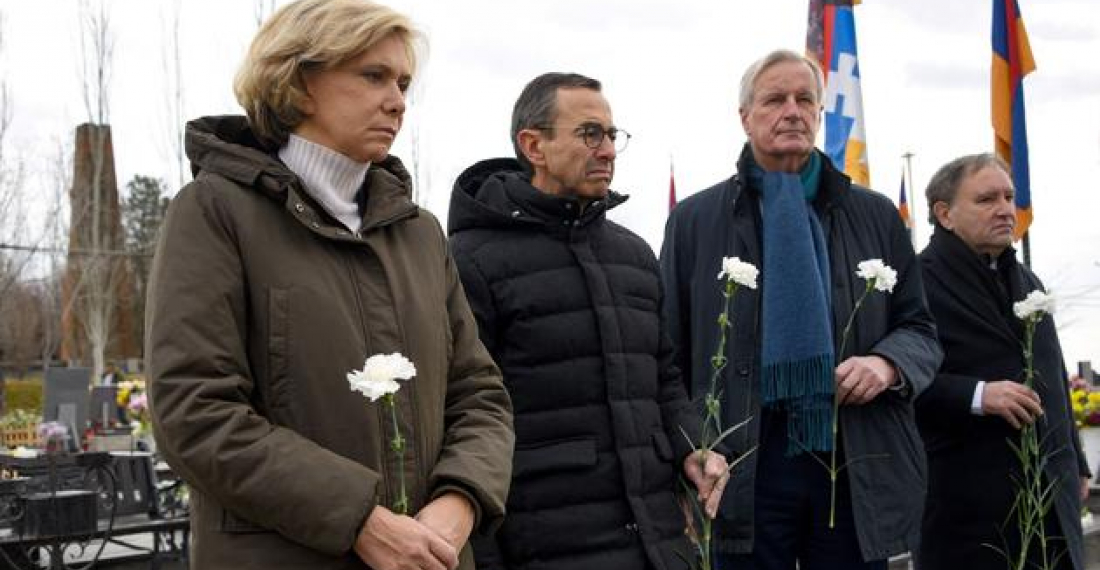Armenia has become a "must visit" destination for those contesting next spring's French presidential elections. Alexandre Petrosyan discusses why, in this oped for commonspace.eu
After announcing his candidacy in the 2022 French presidential election, Eric Zemmour, a controversial, far-right politician, referred to as a French Donald Trump, started his campaign. His first foreign destination was Armenia, where he arrived as he mentions ‘to support the first Christian nation who is today harassed by its two neighbours: Turkey and Azerbaijan’. Despite his expectations, Zemmour was welcomed by a small group of protestors calling him ‘racist, fascist’ and his visit did not receive much attention within Armenia.
Zemmour, who is known for his islamophobia, right-wing populism and anti-immigration views, leads the newly established political party called Reconquête, a reference to the Reconquista period in the Iberian peninsula. During his trip to Armenia, Zemmour visited the Khor Virap monastery, close to the Turkish border, where he explained the Armenian-Turkish relations through an Islamophobic lens. Neither Zemmour, nor his companions realise that Armenian-Turkish and Armenian-Azerbaijani problems are merely political ones and there is no religious ground in any of them. Armenia can’t be regarded as an Islamophobic country, simply because it has very good relations with the neighbouring Islamic Republic of Iran, and her Muslim countries of the Middle East, where hundreds of thousands Armenians live.
Zemmour’s arrival to Armenia had the purpose to attract the votes of the Armenians living in France, and at the same time play to the sensibilities of the Catholics of France, who are particularly interested in the destiny of the Eastern Christians. However, he also causes problems to the long-time leader of the right-wing, Marine Le Pen, who promotes almost the same ideas, but with other labelling. The most important thing which continues to bring other presidential candidates to Armenia is that no one of the candidates has a chance to secure necessary victory in the first round and most probably there will be the second round between the two candidates who will receive the most votes. And the second round is scheduled on 24 April 2022, which is the Armenian Genocide remembrance day. Given the fact that the Armenians are mostly concentrated in Paris, Marseille, Lyon and Valence and their number is estimated to be around 800 000, half of whom have the right to vote, such attention towards Armenia is quite understandable.
A week after Zemmour’s departure, another prominent candidate for the presidency, Valerie Pecresse, former Minister of Budget and incumbent head of the regional council of Ile-de-France, paid a visit to Armenia. According to recent polls, Pecresse has the highest chances of presidential victory, after Macron. Compared with Zemmour, she was warmly welcomed in ‘brotherly Armenia’, where she met with the President, the Speaker of the Parliament and the Minister of Foreign Affairs. Pecresse’s delegation was very representative. Apart from some representatives of the Armenian diaspora, there were Michel Barnier, until recently the EU’s chief Brexit negotiator and Bruno Retailleau, president of the Republicans faction in the French Senate. Besides visiting the Armenian Genocide Memorial Complex and Yerablur Military Pantheon, Pecresse went far beyond established formalities and visited Nagorno-Karabakh, meeting with the president and the minister of foreign affairs, criticising France’s inactivity in the OSCE, and the inability to deliver more humanitarian aid for the post-war restoration process. This immediately triggered an Azerbaijani condemnation and the visitors’ names were added to the long list of that country’s personae non gratae. Pecresse left Armenia with the promise to organise an international conference in Paris in support of Armenia and Arstakh/Karabakh and to activate French foreign policy in the South Caucasus, in case of being elected, as according to her, ‘French security is connected with Armenia as well’.
The next outstanding candidate who tries to convince Armenians and to unite the French Left is Anne Hidalgo, current mayor of Paris. Back in June, during his visit to Paris Pashinyan met with Hidalgo, inviting her to visit Yerevan in autumn. Autumn came and went, and her visit didn’t take place. Instead, she pledges ‘to promote the recognition of the Nagorno-Karabakh Republic’ and also to pursue the criminalization of the Armenian Genocide denial. She has recently initiated the opening ceremony of the ‘Esplanade of Armenia’, when the delegation led by Armenia’s Foreign Affairs Minister was in Paris at the beginning of December.
The final candidate who has the sympathy of the Armenians and right now has the highest chances to be elected is the current president Emanuel Macron. His activity during the Second Karabakh war, the attempts to restore the OSCE Minsk group and to raise the issue of the status of Nagorno-Karabakh, found warm acceptance among Armenians both at home and abroad. Macron’s activity in the OSCE Minsk Group and also in other European affairs are mostly related with his ambitions to replace Merkel at the helm of the EU, and at the same time to silence the voices in opposition who blame him in declining prestige and influence of France. After his visit to Paris in June, Pashinyan stated that Macron’s scheduled visit to Armenia, which was cancelled because of the COVID, would be organised in the autumn. So far, the visit hasn’t taken place. Most probably Macron would visit the region, including Armenia, next year prior to the elections, in order to win the hearts of Armenians.
Any possible outcome of the French presidential elections wouldn’t challenge the current level of relations with Yerevan. France is an important partner for Armenia within the EU as well. Armenia should convert the existing nature of relations with France into more tangible achievements, viewing it as a channel for modernisation, the enhancement of democratic institutions and also an essential source for foreign policy diversification.






